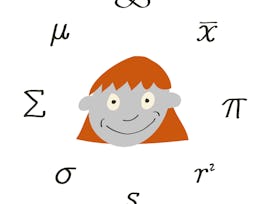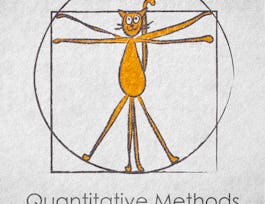Inferential statistics are concerned with making inferences based on relations found in the sample, to relations in the population. Inferential statistics help us decide, for example, whether the differences between groups that we see in our data are strong enough to provide support for our hypothesis that group differences exist in general, in the entire population.


Inferential Statistics
This course is part of Methods and Statistics in Social Sciences Specialization
Taught in English
Some content may not be translated


Instructors: Annemarie Zand Scholten
65,532 already enrolled
Included with 
Course
(584 reviews)
93%
Details to know

Add to your LinkedIn profile
8 quizzes
Course
(584 reviews)
93%
See how employees at top companies are mastering in-demand skills

Build your subject-matter expertise
- Learn new concepts from industry experts
- Gain a foundational understanding of a subject or tool
- Develop job-relevant skills with hands-on projects
- Earn a shareable career certificate


Earn a career certificate
Add this credential to your LinkedIn profile, resume, or CV
Share it on social media and in your performance review

There are 8 modules in this course
[formatted text here]
What's included
1 video10 readings
In this second module of week 1 we dive right in with a quick refresher on statistical hypothesis testing. Since we're assuming you just completed the course Basic Statistics, our treatment is a little more abstract and we go really fast! We provide the relevant Basic Statistics videos in case you need a gentler introduction. After the refresher we discuss methods to compare two groups on a categorical or quantitative dependent variable. We use different test for independent and dependent groups.
What's included
9 videos5 readings1 quiz3 app items
In this module we tackle categorical association. We'll mainly discuss the Chi-squared test that allows us to decide whether two categorical variables are related in the population. If two categorical variables are unrelated you would expect that categories of these variables don't 'go together'. You would expect the number of cases in each category of one variable to be proportionally similar at each level of the other variable. The Chi-squared test helps us to compare the actual number of cases for each combination of categories (the joint frequencies) to the expected number of cases if the variables are unrelated.
What's included
6 videos4 readings1 quiz1 app item
In this module we’ll see how to describe the association between two quantitative variables using simple (linear) regression analysis. Regression analysis allows us to model the relation between two quantitative variables and - based on our sample -decide whether a 'real' relation exists in the population. Regression analysis is more useful than just calculating a correlation coefficient, since it allows us assess how well our regression line fits the data, it helps us to identify outliers and to predict scores on the dependent variable for new cases.
What's included
9 videos4 readings1 quiz1 app item
In this module we’ll see how we can use more than one predictor to describe or predict a quantitative outcome variable. In the social sciences relations between psychological and social variables are generally not very strong, since outcomes are generally influences by complex processes involving many variables. So it really helps to be able to describe an outcome variable with several predictors, not just to increase the fit of the model, but also to assess the individual contribution of each predictor, while controlling for the others.
What's included
8 videos4 readings1 quiz1 app item
In this module we'll discuss analysis of variance, a very popular technique that allows us to compare more than two groups on a quantitative dependent variable. The reason we call it analysis of variance is because we compare two estimates of the variance in the population. If the group means differ in the population then these variance estimates differ. Just like in multiple regression, factorial analysis of variance allows us to investigate the influence of several independent variables.
What's included
6 videos3 readings1 quiz1 app item
In this module we'll discuss the last topic of this course: Non-parametric tests. Until now we've mostly considered tests that require assumptions about the shape of the distribution (z-tests, t-tests and F-tests). Sometimes those assumptions don't hold. Non-parametric tests require fewer of those assumptions. There are several non-parametric tests that correspond to the parametric z-, t- and F-tests. These tests also come in handy when the response variable is an ordered categorical variable as opposed to a quantitative variable. There are also non-parametric equivalents to the correlation coefficient and some tests that have no parametric-counterparts.
What's included
7 videos5 readings1 quiz1 app item
In this final module there's no new material to study. We advise you to take some extra time to review the material from the previous modules and to practice for the final exam. We've provided a practice exam that you can take as many times as you like. The final exam is structured exactly like the practice exam, so you know what to expect. Please note that you can only take the final exam twice every seven days, so make sure you are fully prepared. Please follow the honor code and do not communicate or confer with others while taking this exam or after. In the open questions of the exam (i.e. those that are not multiple choice) you should report your answers to 3 decimal places, and use 5 decimal places in your calculations. Good luck!
What's included
2 quizzes
Instructors


Offered by
Recommended if you're interested in Probability and Statistics

University of Amsterdam

University of Amsterdam

University of Amsterdam

University of Amsterdam
Why people choose Coursera for their career




Learner reviews
Showing 3 of 584
584 reviews
- 5 stars
63.18%
- 4 stars
20.71%
- 3 stars
8.04%
- 2 stars
3.25%
- 1 star
4.79%
New to Probability and Statistics? Start here.

Open new doors with Coursera Plus
Unlimited access to 7,000+ world-class courses, hands-on projects, and job-ready certificate programs - all included in your subscription
Advance your career with an online degree
Earn a degree from world-class universities - 100% online
Join over 3,400 global companies that choose Coursera for Business
Upskill your employees to excel in the digital economy
Frequently asked questions
Access to lectures and assignments depends on your type of enrollment. If you take a course in audit mode, you will be able to see most course materials for free. To access graded assignments and to earn a Certificate, you will need to purchase the Certificate experience, during or after your audit. If you don't see the audit option:
The course may not offer an audit option. You can try a Free Trial instead, or apply for Financial Aid.
The course may offer 'Full Course, No Certificate' instead. This option lets you see all course materials, submit required assessments, and get a final grade. This also means that you will not be able to purchase a Certificate experience.
When you enroll in the course, you get access to all of the courses in the Specialization, and you earn a certificate when you complete the work. Your electronic Certificate will be added to your Accomplishments page - from there, you can print your Certificate or add it to your LinkedIn profile. If you only want to read and view the course content, you can audit the course for free.
If you subscribed, you get a 7-day free trial during which you can cancel at no penalty. After that, we don’t give refunds, but you can cancel your subscription at any time. See our full refund policy.

